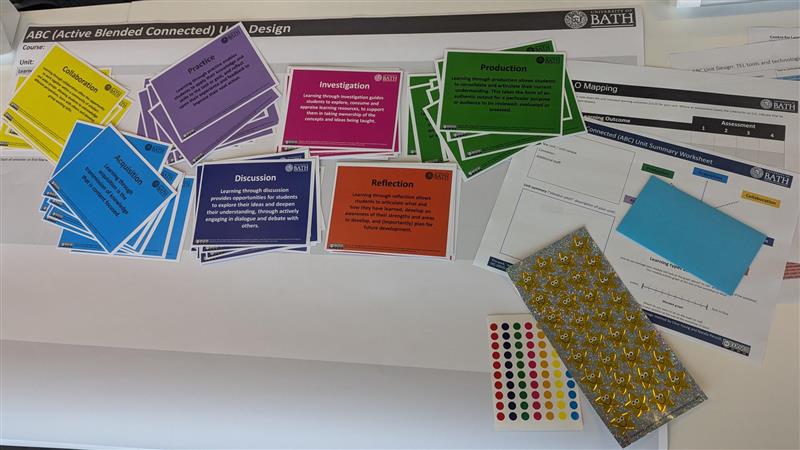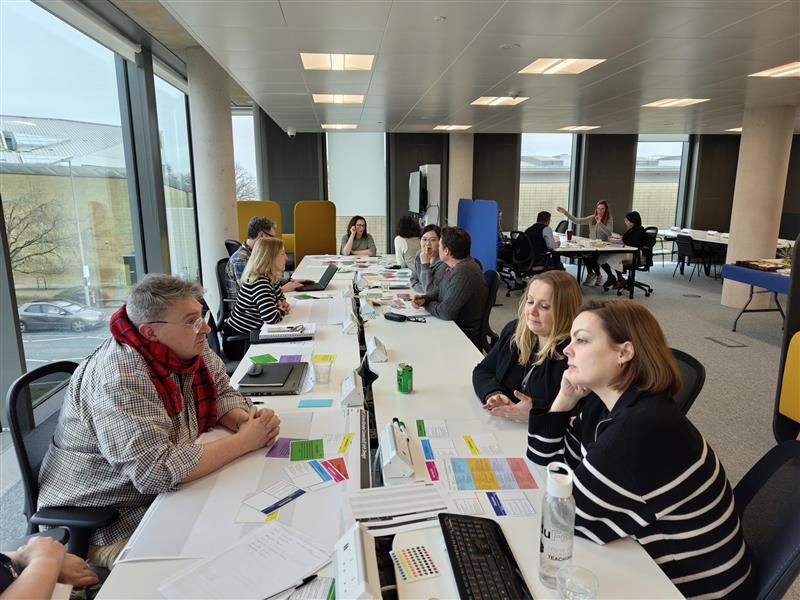Published on: 02/09/2024 · Last updated on: 22/05/2025
What is ABC Learning Design?
ABC Learning Design is a workshop framework for rapid design of units and courses. It was developed at UCL and incorporates Professor Diana Laurillard’s (2012) Learning Types, that break down learning into activity types:
- Acquisition – the transmission of knowledge.
- Discussion – developing understanding through dialogue.
- Investigation – researching and appraising ideas.
- Practice – applying knowledge and skills to tasks or experiments.
- Collaboration – building shared and varied understanding.
- Production – consolidating and articulating knowledge into a tangible output.

The method focuses on blending various learning activities to create a balanced and comprehensive educational experience and using activity cards to build a narrative storyboard of a unit with a shared language and understanding between participants. The key components and principles of ABC Learning Design are about making learning:
- Active – seeing your unit as a series of learning activities that student progress through, with an emphasis on what students do and the context in which they do it.
- Blended – enhancing and streamlining a unit through both physical and digital learning environments. It is about creating inclusive, accessible, and diverse ways of transmitting knowledge and developing students’ skills and competencies.
- Connected – building in opportunities for students to work together, enabling students to apply their learning and participate in authentic learning and assessment.
What can ABC Design Workshops offer your course teams?
This workshop works effectively for course teams that are looking for time to rapidly prototype changes to their course, and the units within, including designing new courses and units. The workshop is participant led and involves participants as unit designers, following a series of timed activities, and using a few key resources to guide. Design emerges from conversation with colleagues to generate ideas and think creatively about what you can do with your units.
ABC learning design workshops give you as course teams, time to focus on producing a plan for your units with support from the CLT to realise your objectives. It creates a level playing field between course teams for open discourse and creativity when setting out on designing teaching and learning activities. The CLT found this method very valuable when we used it to reimagine and overhaul our own Pathways programme, with participants celebrating the shared understanding and language it provided to visualise our sessions and how they fit together as a cohesive whole.
- Promotes course-wide approach
- Opportunities to align ILOs, assessment and learning activity
- Construct learning sequences with a variety of activity and assessment
- Map courses to the university curriculum principles
- A detailed outline of your course and units
How can the workshop be set-up?
Workshops will be bespoke based your team’s needs. Below is a typical set-up for the session:
Length of workshop: 90 minutes (can be longer by request).
Number of attendees: 6 – 40, in groups of 2 – 6.
Workshop format: physical classroom space with tables for group working.
Outputs from workshop: planned storyboards of course, alignment of CILOs/UILOs to activity and assessment.
Benefits of workshop: rapid and focused, shared consensus through the conversational framework.
How can you request a workshop?
If you think ABC design would be useful for your course team, please get in contact to discuss availability:
Email: Daniel Barker dpb45@bath.ac.uk or clt@bath.ac.uk.